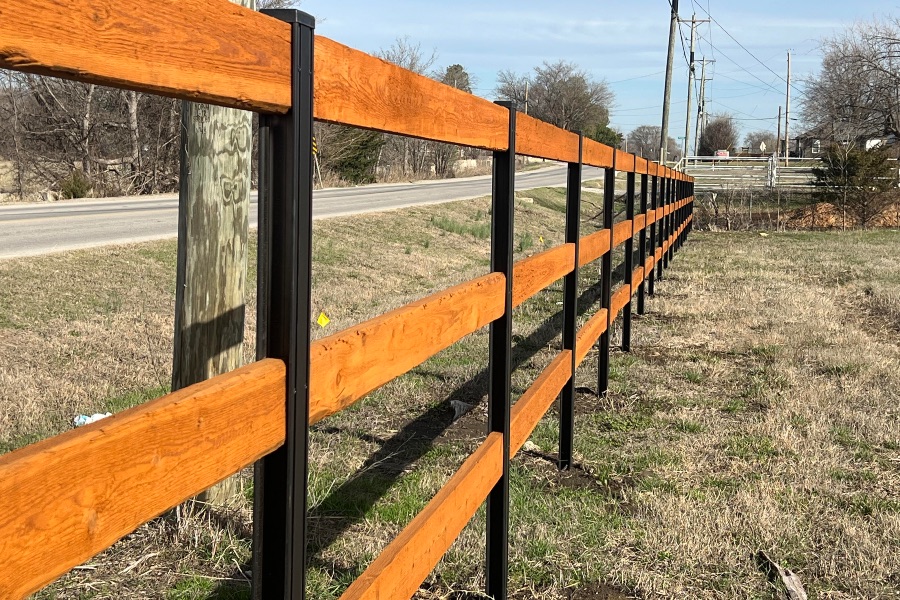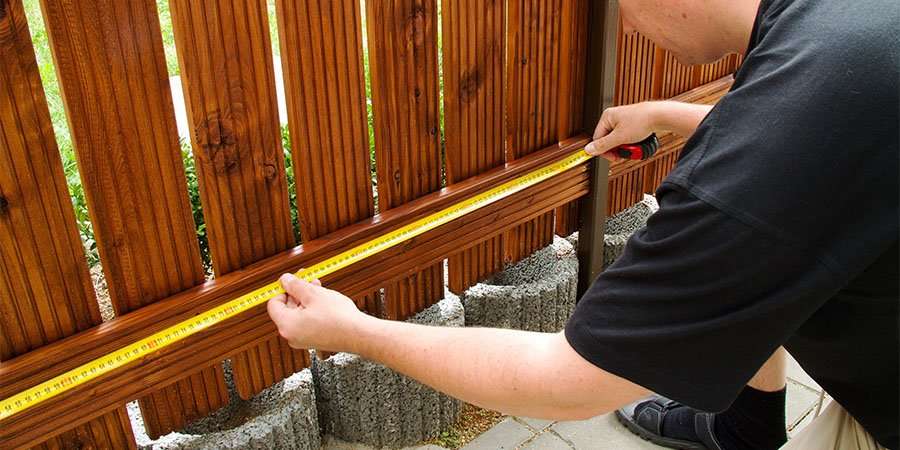All Categories
Featured
When selecting a fence for your residential or commercial property, it's important to consider elements like expense, sturdiness, maintenance, and visual allure. 3 of the most preferred materials for commercial and property fences are light weight aluminum, wood, and vinyl. Each deals special benefits and some downsides, making it essential to examine your requirements before choosing. Below, we contrast the benefits and drawbacks of these products to aid guide your selection.
Timber Fencing. Pros:
![]()
All-natural Visual: Timber fences are understood for their timeless, natural look. They can conveniently blend into most landscapes and enhance the appeal of your home or service. Whether you're aiming for a rustic look or a much more polished surface, wood can be tailored with paint, discolor, or sealer. Modification: Timber is just one of the most flexible products, permitting a wide selection of styles, such as picket fences, personal privacy fences, and ranch-style units. It's very easy to change the style to fit the certain needs of your property. Budget friendly: Generally, wood fences come at a lower initial price compared to plastic or aluminum, making them an affordable alternative for those on a budget. Disadvantages:
Upkeep Requirements: Wood fences require regular maintenance to maintain their appeal and capability. This consists of discoloration or painting to secure against rot, termites, and climate damages. Without proper care, timber can degrade with time. Much Shorter Life-span: Compared to vinyl or light weight aluminum, timber fencings have a tendency to have a much shorter life expectancy, especially in areas with extreme weather. Extreme problems, such as hefty rainfall, moisture, or snow, can trigger timber to degrade a lot more swiftly. Prone to Damage: Timber fences are susceptible to damage from bugs, including termites, along with all-natural wear from climate. They might likewise warp or fracture if not properly maintained. Plastic Fence. Pros:
Reduced Upkeep: Among the main advantages of vinyl fencings is that they need marginal upkeep. Unlike timber, vinyl doesn't require to be painted, sealed, or discolored. It's immune to fading, staining, and fracturing, which saves money and time on maintenance. Sturdiness: Vinyl is known for its capacity to stand up to severe weather condition problems without wearing away. It's unsusceptible pests like termites, and its resistance to wetness and UV rays ensures it continues to be looking great for numerous years. Durable: A vinyl fence can last as much as 30 years or more, making it a terrific long-term financial investment. Numerous makers use guarantees, even more improving its worth. Range of Styles: Vinyl fences are available in numerous colors and styles, including those that resemble timber. You can select from personal privacy, picket, or decorative styles, offering flexibility to match your home or company. Disadvantages:
![]()
Higher Upfront Price: Plastic fencings tend to have a higher preliminary expense than wood. While the lasting cost savings on upkeep are significant, the in advance investment might be a deterrent for some home owners. Restricted Personalization: Vinyl fences been available in conventional layouts, and while designs and colors are different, you may not have as much adaptability for personalization compared to timber. Breaking in Cold Climates: While plastic is durable, in very cool environments, it can become breakable and crack upon influence, which can be troublesome in locations with rough wintertimes. Aluminum Fencing. Pros:
Low Maintenance: Aluminum fences are understood for their low-maintenance needs. Unlike wood, light weight aluminum doesn't corrosion or wear away, and it doesn't need to be painted or secured. This makes it a wonderful selection for those who want a hassle-free choice. Sturdiness and Toughness: Light weight aluminum is a durable product that stands up well to severe weather. It's a superb option for seaside locations where deep sea rust is an issue, as it's resistant to rust. Aesthetic Allure: Light weight aluminum fencings offer a tidy, sophisticated appearance, frequently utilized for ornamental objectives. They're offered in different designs, including ornamental layouts, and can add a premium feeling to your property. Safety: Light weight aluminum fencings are sturdy and deal fantastic security, specifically when set up with gateways or locks. Their durable construction provides a reputable barrier against undesirable entrance. Disadvantages:
![]()
Greater First Expense: Aluminum fencings have a tendency to be more expensive than timber, particularly if you select ornamental layouts. The ahead of time price may be expensive for some. Less Privacy: Aluminum fences normally have larger spaces between the slats, which implies they give less privacy than wood or plastic fences. Light weight aluminum might not be the best option if privacy is a concern. Denting Concerns: While light weight aluminum is rust-resistant, it is susceptible to denting or flexing if struck with pressure. For instance, an automobile accident or heavy influence can create long-term damages to the fence. Which Fencing Product is Right for You? Picking the ideal fencing depends on a number of elements, including your budget plan, design choices, maintenance capacity, and the atmosphere in which you live. If you desire a natural look and are prepared for regular maintenance, wood could be the right choice.
Ultimately, each fencing material has its pros and disadvantages, so it's essential to assess what matters most for your certain demands. Think about the climate, the degree of privacy you need, and just how much maintenance you agree to dedicate to, and you'll discover the ideal fencing for your property.
Timber Fencing. Pros:

All-natural Visual: Timber fences are understood for their timeless, natural look. They can conveniently blend into most landscapes and enhance the appeal of your home or service. Whether you're aiming for a rustic look or a much more polished surface, wood can be tailored with paint, discolor, or sealer. Modification: Timber is just one of the most flexible products, permitting a wide selection of styles, such as picket fences, personal privacy fences, and ranch-style units. It's very easy to change the style to fit the certain needs of your property. Budget friendly: Generally, wood fences come at a lower initial price compared to plastic or aluminum, making them an affordable alternative for those on a budget. Disadvantages:
Upkeep Requirements: Wood fences require regular maintenance to maintain their appeal and capability. This consists of discoloration or painting to secure against rot, termites, and climate damages. Without proper care, timber can degrade with time. Much Shorter Life-span: Compared to vinyl or light weight aluminum, timber fencings have a tendency to have a much shorter life expectancy, especially in areas with extreme weather. Extreme problems, such as hefty rainfall, moisture, or snow, can trigger timber to degrade a lot more swiftly. Prone to Damage: Timber fences are susceptible to damage from bugs, including termites, along with all-natural wear from climate. They might likewise warp or fracture if not properly maintained. Plastic Fence. Pros:
Reduced Upkeep: Among the main advantages of vinyl fencings is that they need marginal upkeep. Unlike timber, vinyl doesn't require to be painted, sealed, or discolored. It's immune to fading, staining, and fracturing, which saves money and time on maintenance. Sturdiness: Vinyl is known for its capacity to stand up to severe weather condition problems without wearing away. It's unsusceptible pests like termites, and its resistance to wetness and UV rays ensures it continues to be looking great for numerous years. Durable: A vinyl fence can last as much as 30 years or more, making it a terrific long-term financial investment. Numerous makers use guarantees, even more improving its worth. Range of Styles: Vinyl fences are available in numerous colors and styles, including those that resemble timber. You can select from personal privacy, picket, or decorative styles, offering flexibility to match your home or company. Disadvantages:

Higher Upfront Price: Plastic fencings tend to have a higher preliminary expense than wood. While the lasting cost savings on upkeep are significant, the in advance investment might be a deterrent for some home owners. Restricted Personalization: Vinyl fences been available in conventional layouts, and while designs and colors are different, you may not have as much adaptability for personalization compared to timber. Breaking in Cold Climates: While plastic is durable, in very cool environments, it can become breakable and crack upon influence, which can be troublesome in locations with rough wintertimes. Aluminum Fencing. Pros:
Low Maintenance: Aluminum fences are understood for their low-maintenance needs. Unlike wood, light weight aluminum doesn't corrosion or wear away, and it doesn't need to be painted or secured. This makes it a wonderful selection for those who want a hassle-free choice. Sturdiness and Toughness: Light weight aluminum is a durable product that stands up well to severe weather. It's a superb option for seaside locations where deep sea rust is an issue, as it's resistant to rust. Aesthetic Allure: Light weight aluminum fencings offer a tidy, sophisticated appearance, frequently utilized for ornamental objectives. They're offered in different designs, including ornamental layouts, and can add a premium feeling to your property. Safety: Light weight aluminum fencings are sturdy and deal fantastic security, specifically when set up with gateways or locks. Their durable construction provides a reputable barrier against undesirable entrance. Disadvantages:

Greater First Expense: Aluminum fencings have a tendency to be more expensive than timber, particularly if you select ornamental layouts. The ahead of time price may be expensive for some. Less Privacy: Aluminum fences normally have larger spaces between the slats, which implies they give less privacy than wood or plastic fences. Light weight aluminum might not be the best option if privacy is a concern. Denting Concerns: While light weight aluminum is rust-resistant, it is susceptible to denting or flexing if struck with pressure. For instance, an automobile accident or heavy influence can create long-term damages to the fence. Which Fencing Product is Right for You? Picking the ideal fencing depends on a number of elements, including your budget plan, design choices, maintenance capacity, and the atmosphere in which you live. If you desire a natural look and are prepared for regular maintenance, wood could be the right choice.
Ultimately, each fencing material has its pros and disadvantages, so it's essential to assess what matters most for your certain demands. Think about the climate, the degree of privacy you need, and just how much maintenance you agree to dedicate to, and you'll discover the ideal fencing for your property.
Latest Posts
The Benefits of Regular Vehicle Maintenance at Montclare Auto Repair Reduces Costs
Published May 18, 25
1 min read
Check Out the Greatest Auto Repair Offers in Montclare, Chicago
Published May 17, 25
1 min read
Experience the Taste of the Shore at Deauville Inn’s Oyster Bar
Published May 17, 25
2 min read
More
Latest Posts
The Benefits of Regular Vehicle Maintenance at Montclare Auto Repair Reduces Costs
Published May 18, 25
1 min read
Check Out the Greatest Auto Repair Offers in Montclare, Chicago
Published May 17, 25
1 min read
Experience the Taste of the Shore at Deauville Inn’s Oyster Bar
Published May 17, 25
2 min read